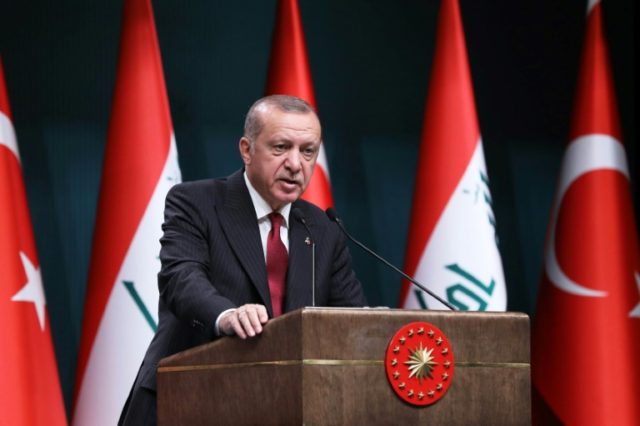Turkish President Recep Tayyip Erdoğan signed a decree Wednesday imposing new tariffs on American rice, alcohol, and other products, revealed shortly after a Turkish court in Izmir once again rejected a request to release American pastor Andrew Brunson.
The Trump administration has made Brunson’s release a priority, accusing Turkey of fabricating charges against him and holding him as a political prisoner. Brunson stands accused of supporting both U.S.-based Islamic cleric Fethullah Gülen and the Marxist Kurdistan Workers’ Party (PKK) terrorist organization. Brunson denies the charges, noting that his Christian faith makes him incompatible with both groups.
Erdoğan has stated in the past that Brunson’s arrest was intended to allow Ankara to trade” him for extraditing Gülen, who lives in Pennsylvania. The Turkish government claims Gülen is responsible for the failed coup against Erdoğan in 2016; American officials have repeatedly said Ankara has not provided sufficient evidence for extradition to occur.
The Turkish newspaper Hurriyet reported on Wednesday that the Turkish government published a decree that morning imposing tariffs on American “rice, tobacco products, vehicles, alcohol, coal, and cosmetics.” Already existing tariffs on cars were also doubled to discourage business with the United States. Hurriyet notes that Erdoğan and his administration have begun using the phrase “economic war” to describe their relationship with Washington, echoing the language of increasingly prominent Erdoğan ally Venezuelan dictator Nicolás Maduro.
During remarks Tuesday, Erdoğan made clear that Turkish economic retribution would not end with cosmetics and alcohol. “They don’t hesitate to use the economy as a weapon,” the president noted, suggesting that Turkey may soon boycott American electronics, including the iPhone. “If they have the iPhone, there is Samsung elsewhere. We have Vestel,” he noted.
Erdoğan’s claim that the United States is using “the economy as a weapon” is a response to sanctions imposed on high-ranking Turkish justice officials this month in response to the continued detention of Pastor Brunson. The U.S. Department of Treasury sanctioned Turkey’s Minister of Justice Abdulhamit Gul and Minister of Interior Suleyman Soylu in early August over their roles in Brunson’s detention.
“We’ve seen no evidence that Pastor Brunson has done anything wrong and we believe he is a victim of unfair and unjust detention by the government of Turkey,” White House Press Secretary Sarah Sanders said at the time. The sanctions, she explained, would block “any property or interest in property of both ministers within U.S. jurisdiction … and U.S. persons are generally prohibited from engaging in transactions with them.”
The ministers responded by condemning the sanctions and claiming not to have any economic interests or properties in the United States.
Following the release of new tariffs on American products Wednesday, Turkish presidential spokesman İbrahim Kalın expressed hope that the two nations would resolve their issues, but insisted that Washington must stop petitioning for Brunson’s release.
“As they are taking relations with Turkey to a breaking point for one pastor, we have yet to see either the Obama or the Trump administration take any concrete steps towards Turkey’s rightful and urgent national security matters,” Kalın claimed.
The White House does not appear to be decreasing its pressure on Turkey to release Brunson.
“The president has a great deal of frustration on the fact that Pastor Brunson has not been released as well as the fact that other U.S. citizens and employees of diplomatic facilities have not been released,” Sanders said at a White House briefing Tuesday.
On Wednesday, the Izmir court responsible for Brunson’s case once again rejected an appeal to release him, arguing insufficient evidence exists to keep him detained. Brunson is currently under house arrest, released from prison due to increasingly dire health concerns he developed while imprisoned. His attorney will not be able to appeal for release again until his next scheduled hearing on October 12. Brunson faces 35 years in prison on the alleged terrorism charges and has been held in detention since late 2016.

COMMENTS
Please let us know if you're having issues with commenting.